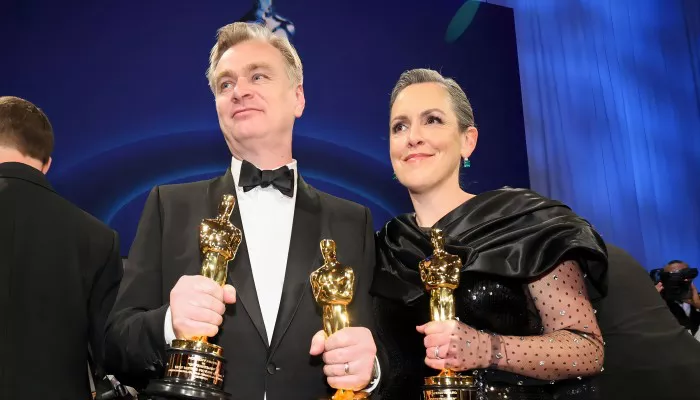A Cinematic Genius
Christopher Nolan stands as one of the most influential and visionary filmmakers of his generation, renowned for his unparalleled storytelling prowess, innovative narrative techniques, and commitment to pushing the boundaries of cinema. With a diverse body of work that spans genres and captivates audiences worldwide, Nolan has solidified his place in the pantheon of cinematic legends. In this detailed introduction, we delve into the life, career, and artistic vision of Christopher Nolan, exploring the key influences, themes, and achievements that have shaped his remarkable journey in the world of filmmaking.
Early Life and Influences
Christopher Edward Nolan was born on July 30, 1970, in London, England, to an English father and an American mother. Raised in a creative and intellectually stimulating environment, Nolan developed an early passion for storytelling and filmmaking. He cites his childhood love of movies, particularly the works of directors such as Stanley Kubrick, Alfred Hitchcock, and Ridley Scott, as formative influences that ignited his desire to pursue a career in film.
Education and Early Career
After completing his schooling, Nolan went on to study English literature at University College London. It was during this time that he began experimenting with filmmaking, creating short films with his friends and honing his craft as a storyteller. Nolan’s early forays into filmmaking laid the groundwork for his future success, as he learned valuable lessons about storytelling, visual aesthetics, and the technical aspects of filmmaking.
Breakthrough with “Following” and “Memento”
Nolan’s breakthrough came with his debut feature film, “Following,” released in 1998. Shot on a shoestring budget with a small crew and amateur actors, “Following” showcased Nolan’s talent for intricate storytelling and non-linear narrative structure. The film received critical acclaim for its originality and innovation, paving the way for Nolan’s ascent in the world of cinema.
However, it was Nolan’s sophomore effort, “Memento” (2000), that catapulted him to international prominence. Adapted from a short story by his brother, Jonathan Nolan, “Memento” stunned audiences and critics alike with its bold narrative structure, which unfolds in reverse chronological order. The film’s intricate plot, coupled with its exploration of memory, identity, and perception, established Nolan as a filmmaker of exceptional vision and intellect.
Mainstream Success with “The Dark Knight” Trilogy
Nolan’s career reached new heights with his groundbreaking work on “The Dark Knight” trilogy, a series of superhero films based on the DC Comics character Batman. Beginning with “Batman Begins” (2005), Nolan reimagined the iconic superhero franchise with a darker, more grounded approach, focusing on themes of fear, justice, and the nature of heroism.
The second installment in the trilogy, “The Dark Knight” (2008), stands as a defining moment in Nolan’s career and in the history of superhero cinema. The film, which features an iconic performance by Heath Ledger as the Joker, received widespread critical acclaim and became a cultural phenomenon, setting new benchmarks for the genre and earning Nolan widespread recognition as a master filmmaker.
The trilogy concluded with “The Dark Knight Rises” (2012), which brought Nolan’s epic saga to a thrilling and emotionally satisfying conclusion. Throughout the trilogy, Nolan’s meticulous attention to detail, complex characters, and thematic depth elevated the superhero genre to new heights, cementing his status as a visionary director with a unique cinematic voice.
Exploring Mind-Bending Realities with “Inception” and “Interstellar”
In the years following “The Dark Knight” trilogy, Nolan continued to push the boundaries of storytelling with ambitious and visually stunning projects. “Inception” (2010), a mind-bending heist film set within the realm of dreams, showcased Nolan’s gift for weaving intricate narratives and exploring complex themes. The film’s innovative visual effects, combined with its exploration of memory, perception, and reality, earned it widespread acclaim and multiple Academy Award nominations.
Nolan further solidified his reputation as a master of science fiction with “Interstellar” (2014), an epic space odyssey that delves into themes of love, time, and the survival of the human race. The film’s breathtaking visuals, coupled with its emotionally resonant storytelling and thought-provoking concepts, captivated audiences and critics alike, reaffirming Nolan’s status as one of the most visionary directors of his generation.
Commitment to Practical Filmmaking and Artistic Integrity
Throughout his career, Nolan has remained committed to the principles of practical filmmaking and artistic integrity. He eschews excessive use of CGI in favor of practical effects and real locations, believing that tangible elements contribute to a more immersive and authentic cinematic experience. Nolan’s dedication to his craft and refusal to compromise his artistic vision have earned him the respect and admiration of peers and audiences alike.
Conclusion
In conclusion, Christopher Nolan stands as a cinematic visionary whose groundbreaking work has redefined the possibilities of storytelling in film. From his early experiments with non-linear narrative structure to his epic blockbusters that explore the depths of the human psyche and the cosmos, Nolan’s films are marked by their intelligence, ambition, and emotional resonance. As he continues to challenge audiences with his thought-provoking narratives and breathtaking visuals, Christopher Nolan remains at the forefront of modern cinema, inspiring future generations of filmmakers to push the boundaries of what is possible on the silver screen.
https://www.rnada.com/archives/12697
https://www.rnada.com/archives/12586
https://www.rnada.com/archives/12606

